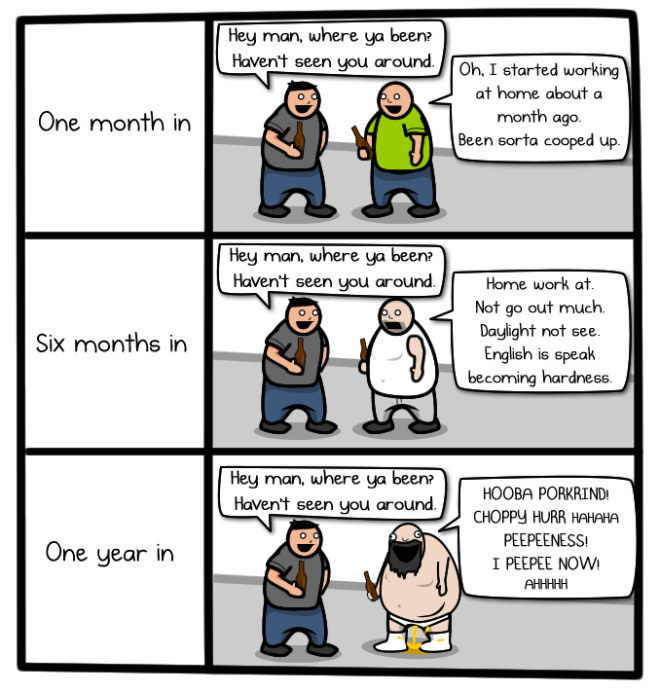Do you work from home? Or are you a remote worker? The answer may surprise you. I got interested in the different terms we use to discuss remote work/ distributed work/ telecommuting/ working from home while watching Office Optional. Sarah Milstein kicked things off and in her opening remarks she pointed out that we don’t have a common language for discussing the “office-less” work that so many people do.
Can we all just agree to call it “Remote Work”? #officeoptional
— Rock Hymas (@rockhymas) April 22, 2014
I shared my initial opinion on twitter during the Office Optional livestream. But I realized that in order to come up with some scientific answers, research was required. Let’s turn to that source of all modern knowledge: Google.
Note: All searches were done in an incognito session, in an attempt to get less biased results.
First up, image search. Here’s the first page of image results for “remote work”:

And here’s the first page of image results for “work from home”:

At a glance, it should be obvious that people who work from home are mostly women. Remote workers are primarily men. Google said so.
But let’s dig in a little further. On the “work from home” search, we get the following statistics:
| Women | 16 |
| Men | 6 |
| Women w/children | 4 |
| Men w/children | 0 |
And on the “remote work” search we see this:
| Women | 2 |
| Men | 17 |
| Women w/children | 0 |
| Men w/children | 0 |
As you can see, remote workers don’t have kids. People who work from home do, but only if they’re women. That must mean I’m neither a remote worker nor a work-from-home-er.
Maybe I do “distributed work”?

Well, if so, then I’m a 3D model that vaguely resembles a human, and may be differentiated from other 3D quasi-humans only by color. We communicate via 3D arrows.
Aha, maybe I’m a telecommuter?

No, telecommuters are primarily cartoon characters, often from Dilbert. At least here, men and women, the real ones, not the cartoons, seem equally represented. Also, they’re all dressed, whereas the cartoon characters have about a 33% chance of being in some state of undress. Thinking back on the last week, that ratio sounds about right.
I also noticed that The Oatmeal got itself a cartoon on the first page of image links for both the “work from home” and “remote work” searches. Though the “worker” in both cases is a man, it’s shouldn’t be surprising that the cartoon with a woman showed up on the “work from home” search.


Both are from this The Oatmeal post. Warning: The Oatmeal is crass, crude, and vulgar, in case it wasn’t obvious.
Ok, next up, trendlines.
From the chart, it’s clear that “work from home” is the most popular term. But it’s popularity has been waning over the last ten years. “Remote work” is the upstart, and seems to have replace “telecommute” over the last ten years, with definite gains since 2008. It appears that at the same time each year “work from home” searches drop and “remote work” searches surge. Not sure what’s going on there, but it would be interesting to study further.
Finally, we can look at the regular web results for each search. Here, both searches include links to job listings: career builder, indeed, etc. “Remote work” points to some other smaller sites like weworkremotely.com and skipthedrive.com. The weworkremotely.com link isn’t suprising, because the first link on that page is to the 37 signals book, Remote. “Work from home” has more big-name job search engines: Simply Hired, etc. It also has how-to type articles, one at womenforhire.com, and another at bankrate.com, of all places. The “remote work” search includes a link to the Wikipedia article on telecommuting, while the “work from home” search has the Wikipedia article on work-at-home get rich quick schemes.
Conclusions
Hm, I’m not sure I have any conclusions. Solving this problem by adding a new term seems like a horrible idea. But none of the existing terms are all that useful. Yeah, I “work from home”, but not everybody who doesn’t have an office to go to does. I’ve talked to testers who use cell data plans and roam the country in RVs. And while I like the term “remote work”, the fact is that at a company like Articulate, where everybody is “remote”, then you have to ask what are we remote from? Not a central office. Telecommute might make sense if I spent my days on the phone. I’m more of a ‘net commuter. I commute to our team “office”, i.e. the Storyline HipChat lobby, via my internet connection. I share my work via the net, I talk with my team via the net, my work is organized on the net. But seriously, let’s all stick with “remote work”.
So, now that you know the science, what are you? A remote worker? A telecommuter? Or do you work from home?

